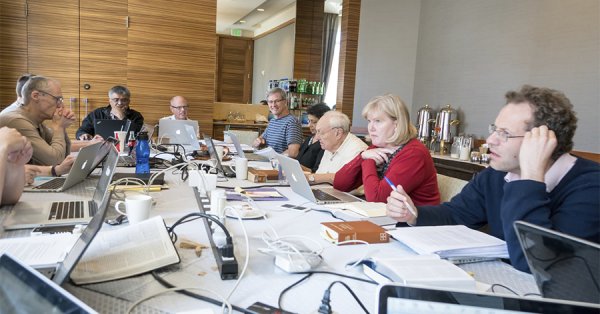Oscar Wilde: A cynic is someone who knows the cost of everything, but the value of nothing.
Biblica is about the Bible – God’s Word – in print, digital and audio-visual format. We translate the Bible into strategic languages of the world in a way people understand, so they are transformed by Christ and inspired to join God’s mission to the world.
For more than two hundred years Biblica’s ministry was based around the Bible. Since its humble beginnings in 1809 as the New York Bible Society with a focus Bible distribution and placement, ministry to migrants and prisoners, and support of William Carey’s translation work in India, Biblica become involved in Bible translation boots and all by sponsoring the New International Version (NIV) which became the version that pioneered and set the standard for Bible translation in the twentieth century. Translation is foundational to everything we do. That, however, does not mean that translation is easy. Translation is difficult – and never done…
For more than two thousand years God’s people have been translating his message despite the ancient Roman cynicism regarding translation as expressed in the Italian adage traduttore, traditore (translator, traitor). In the Middle Ages, many a translator has paid in blood for risking their hand at translation. Referring to the risks involved in translation, Andrew Walls (1990:24) states that “[E]xact transmission of meaning from one linguistic medium to another is continually hampered not only by structural and cultural difference; the words of the receptor language are pre-loaded, and the old cargo drags the new into areas uncharted in the source language. In the end, the translator has simply to do his best and take risks in a high-risk business.” He goes on to say that “…translation is the art of the impossible.”

This does not mean that we should not embark on translation; however, it highlights the risks inherent in the translation process. Jacobus Naudé (2013: 158) refers to another kind of risk translators face in the necessary process of selection that is inherent when translating from one language to another, since “[N]ot everything in a source text can be rendered in a translation; because of the dynamics of language, it is impossible ever to relate everything. This fact foregrounds the agency role of the translator, who has to decide on the interplay between source text and target text and then choose which features of the source text merit greater prominence in the translation. There is thus no neutral translation; the question is not whether the translator is ideologically involved in the text, but how.”
Due to the fragile nature of the translation process, it is essential that we approach translation in humility and dependence on God, fully aware of our limitations and the limitations of human language. At the same time, we do our best to provide adequate training and a rigorous translation process to limit human error along the way as best we can. In some ways, translation will always be “a work in progress”, since new discoveries in biblical scholarship and the fact that language changes over time create the need for ongoing translation, whether it is a brand-new first-time translation or a revision whereby we systematically and strategically update our translations in order to ensure both accuracy and readability.
In addition to the above-mentioned risks, there is also a significant cost factor involved in translation. During the post-WWII days when the vision for a new contemporary English translation for the English-speaking world was born, hardly any organisation was willing to step forward to supply the funds needed to realize this vision. When Biblica finally agreed to take on the responsibility to fund the translation of the NIV, it had no idea that this would almost bankrupt the Society, forcing it to sell its premises in Manhattan and move to New Jersey, with the Board Directors and staff making huge sacrifices to keep the translation going and see it through to completion. Even today, there is a significant cost factor to translation. From an organizational perspective it requires the investment of time and money, but it also demands significant sacrifice on a personal level: some translators live in isolated areas, at times they face loneliness, ridicule or even persecution, they labor long hours over difficult passages, and are seldom sufficiently recognized and rewarded for their commitment.
Translation is a costly long-term investment fraught with risks at the turning of every page. It would be easy to be cynical and shy away from the cost of translation. Yet, at Biblica, we choose to accept the challenge of translation, because we value God’s Word and believe that God continues to speak powerfully in and through his Word to transform individuals and communities with his Truth.
References:
Andrew Walls. 1990 The translation principle in Christian history. In Stine, Philip C. (ed). 1990. Bible translation and the spread of the church: The last 200 years. Leiden: Brill. Studies in Christian Mission, Volume 2, ed. by Marc R. Spindler. (pp. 24-39)
Naudé, Jacobus A. 2013. The Role of the Metatexts in the King James Version as a means of mediating conflicting theological views. In David G. Burke, John F Kutsko and Philip H. Towner (Eds), The King James Version at 400: Assessing Its Genius as Bible Translation and Its Literary Influence (pp. 157-194). Forthcoming.





